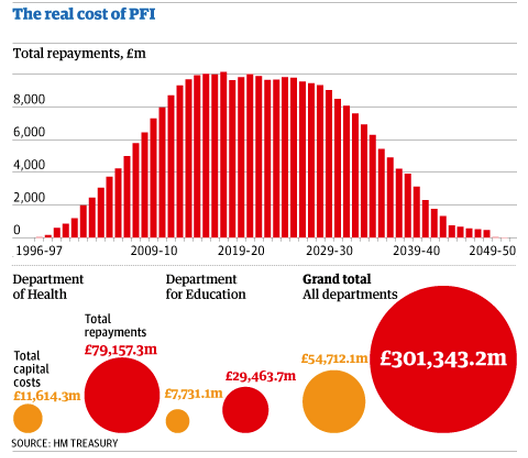With Private Finance Initiatives, the UK owes £300bn on assets worth only £50bn. This failed policy of the Blair years is finally being exorcised by the party.

John McDonnell announced today that a Labour government would bring PFI contracts back under public ownership. The policy championed by Blair has already cost British taxpayers £100bn, mostly in interest payments.
Private Finance Initiatives, by which new public buildings are built and owned by private companies and rented back to public bodies, will be scrapped if Labour wins power, the shadow chancellor John McDonnell said today.
McDonnell said that existing PFI-built schools, hospitals and other public buildings would be brought “back in house” and no new PFI deals would be made.
“I can tell you today, it’s what you’ve been calling for”, he told Labour conference in Brighton, adding:
“The scandal of PFI, launched by John Major, has resulted in huge long-term costs for taxpayers whilst handing out enormous profits to some companies.”
Although PFI was introduced by John Major’s Conservative government in the early 90s, the schemes were massively expanded by Tony Blair and Gordon Brown.
Overall, the UK has about 700 PFI projects and the debt owed on them stands at around £200b — and it will take 35 years to pay off. £100bn has already been paid to the private providers.
PFI deals will have cost the UK taxpayer around £300bn, once they’re finally paid off in about 40 years.
Out of this we’ll have gained assets — hospitals, schools, roads etc. — worth about £50bn. So, essentially PFI is costing the British public £250bn in interest on badly thought through private loans.
The NHS is particularly overburdened with PFI debt. Over 100 hospitals have been built under PFI since the 1990s and the charges NHS tursts are paying on these are often crippling.
Overall, NHS trusts pay about £2bn a year in loan repayments and maintenance charges to the private companies that own and service these hospitals.
Some NHS trusts like Sherwood Forest are ploughing over fifteen per cent of their annual budgets into these PFI repayments.
Not only is PFI a huge waste of money, but the buildings its paid for have often been incredibly shoddily built, with contractors cutting corners everywhere — leaving PFI-built schools and hospitals often woefully unsafe.
McDonnell’s announcement is a clear break with one of New Labour’s biggest economic scandals. It’s encouraging that Labour are having an honest and frank discussion about the party’s past failures. The neoliberal dogma of the Blair era seems well and truly over.
To reach hundreds of thousands of new readers and to make the biggest impact we can in the next general election, we need to grow our donor base substantially.
That's why in 2024, we are seeking to generate 150 additional regular donors to support Left Foot Forward's work.
We still need another 124 people to donate to hit the target. You can help. Donate today.





5 Responses to “Labour should be applauded for finally addressing their £300bn PFI scandal”
Dulari-Leiylah Markelke
Check out exposure tory sponsored Nuffield trust CBI gov think tank horrified it’s got to be addressed and stopped no wonder nhs being privatised like everything else. These are the very issues that society need to be fully exposed to.
ad
So how much will it cost to buy those contracts back?
bjsalba
Edinburgh Council schools built at a time when the Labour/Lib-Dem administration was returning money to the treasury because they “did not know what to do with it”.
When walls fell down recently BBC Scotland kept asking the Scottish Government – (SNP) what they were going to do about it. Labour was never mentioned.
Jay ginn
Tragic that New Labour slavishly followed the Tory policy of PFI despite early warnings from academic analysts such as Professor Allyson Pollock that the contracts offered incredibly poor value for taxpayers money and should be stopped.
why did it take two decades for the mainstream media to publicise the PFI rip off ?
Misha Carder
Its about time PPI were phased out. I thought it was a ridiculous a short term vote catcher at the time. I cannot understand why Tony Blair wasn’t sued for using Labour in his spin New Labour aka Tory Lite.
We are all paying the costs of the interest in last services.